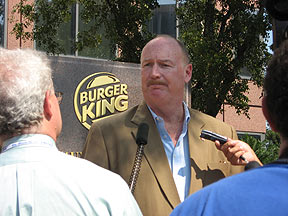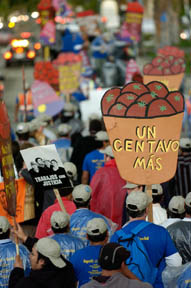UPDATE 10/12/07: Straight from the horse’s mouth, Burger King backs off from previous statements about CIW agreements, demands!… Pressed by a reporter on  misleading statements he made in his letter to the Palm Beach Post, Burger King’s Steve Grover (pictured on right) has changed his tune regarding the CIW’s demands and the nature of the CIW’s agreements with Yum Brands and McDonald’s.
misleading statements he made in his letter to the Palm Beach Post, Burger King’s Steve Grover (pictured on right) has changed his tune regarding the CIW’s demands and the nature of the CIW’s agreements with Yum Brands and McDonald’s.
We’ll let Mr. Grover speak for himself. Here’s an excerpt from the wonderfully informative article published in the latest Ft. Myers Weekly article, entitled “Local workers movement targets Burger King” (10/11/07):
“(W)hen he was asked to recall that he had mentioned payments in his letter to the Palm Beach Post and in a statement to the Naples Daily News, Grover amended his statement.
“What the CIW has wanted is a large annual payment, or check, to cover the payment to the workers,” Grover said. “To be passed along to the workers, all right? They’ve tried to twist the words around so that it sounds like a clause.”
When asked to specify who in the CIW made this request Grover said, “You have to understand the tomato pickers, tomato harvesters in Immokalee come here in November. They harvest the tomatoes for three months. What the CIW has said is they want us to pay an additional penny a pound to every harvester who harvests a Burger King tomato.”
Grover was asked to clarify if there was even a request for money to be paid to the CIW.
“Not to the CIW itself, no,” Grover said. “They are very vague on how the money would be passed, how it would go or anything. What they want is whether it’s a third party or who it would go through, where it would go, those details have never been offered. What they want is for us to pass money to the workers.” read the article in its entirety here
While his answers are a virtual study in convolution (never has the expression “What a tangled web we weave…” seemed more appropriate), Mr. Grover somehow still manages to set the record straight one two of the most deceptive claims contained in his letter to the Post. To wit: 1) The CIW never demanded that Burger King “simply write it a check,” as he had claimed to the Post, and, 2) The CIW never demanded that the payments be run through the CIW, but rather through a “third party,” as he nearly manages to explain in the final paragraph above.
Grover still can’t get his facts right, though. He again insists that the CIW has demanded a “large annual payment” when the fact that payments to workers are made on a weekly or bi-weekly basis was part of the briefing Mr. Grover and Burger King received from Yum Brands on the Taco Bell payment process. And he claims workers only pick tomatoes for three months in Immokalee, which would come as news to the thousands of workers busily picking tomatoes during the spring harvest months from March to May…
But it seems that Burger King’s baldfaced attempt to impugn the integrity of the CIW and the Campaign for Fair Food has not fared well in the weeks since it was launched. We can only hope, now that this misguided strategy has finally been abandoned, voices of reason within Burger King will prevail and we can move forward together to improve the lives of the men and women who work Florida’s fields to put tomatoes in Burger King’s restaurants. Scroll down for more on the CIW’s response to Burger King’s letter to the Palm Beach Post.
9/26/07: Left with no good arguments in its defense, Burger King resorts to lies and innuendo in effort to hold off rising tide of social responsibility in the fast-food industry…
[NOTE: The report that follows is a bit lengthier than we would have liked, but we really had no choice, as we had to both rehash all the tawdry details of Burger King’s new strategy and set the record straight. Please bear with us and take a few minutes to read the report in its entirety. Thanks.]
| What others are saying about Burger King’s statements on CIW agreements with Yum and McDonald’s: | ||
|
It is regrettable that Burger King has chosen to make such wrong and harmful statements. Yum Brands and McDonald’s have stepped forward and put their principles into action. Others in the restaurant and supermarket industries can and should join them. It is in the interests of all concerned to work together to modernize labor standards and practices in order to make labor abuses in Florida a thing of the past.” Tom Crick |
During such conversations the CIW specifically rejected any and all proposals that might route a corporation’s payment of an increase to the farmworkers through the CIW. The central provision of the CIW’s campaign is that fast-food corporations change their purchasing practices so that they ensure workers’ human rights, rather than create conditions where human rights abuses flourish. If this is to be accomplished, it is the corporation’s own supply chain that must itself route the payment to the workers. Neither conceptually nor mechanically would it work for CIW to act as a conduit for these payments. As a result, the penny-per-pound arrangements go directly from the corporate purchasers to the workers without in any way passing through the CIW.” Rev. Clifton Kirkpatrick |
“Dear Steve, It has come to our attention that there has been some confusion in the Florida press regarding our relationship with the CIW. Several of the articles have referenced Burger King so allow me to clarify for you. As we have discussed in the past, we entered into an Agreement in 2005 with the CIW for the workers who pick tomatoes for Taco Bell purchased from participating growers in Florida. The Agreement calls for payment of an additional penny per pound made to the tomato farm workers, through a third party administrator. It is made directly to the workers in the form of a check. We review the payments quarterly. At no time have we paid anything directly or indirectly to the CIW. We have subsequently expanded this penny per pound arrangement to Pizza Hut and KFC for tomatoes purchased from participating growers in Florida. We are very pleased with our relationship with the CIW and we believe they are honest partners in supporting the Florida tomato farm workers. The Agreement that we discussed with you at Burger King remains in full force and effect today, and we hope your company and others in the restaurant and supermarket industries will follow our lead. Please feel free to call with any questions. With best regards, |
“Every violation of truth is not only a sort of suicide in the liar,
but is a stab at the health of human society.”
Ralph Waldo Emerson
 The Emperor’s New Strategy: It has come to this. Burger King’s grand strategy for justifying its refusal to work with the CIW has come to this: A big, fat lie. A remarkably desperate lie.
The Emperor’s New Strategy: It has come to this. Burger King’s grand strategy for justifying its refusal to work with the CIW has come to this: A big, fat lie. A remarkably desperate lie.
OK, we know what you’re thinking, “Whoa, that’s kind of harsh. What happened to the CIW’s customary restraint?”
Don’t worry, our restraint is still intact. But in fact, “lie” really is the only adequate description for what is now clearly Burger King’s principal public relations tactic in response to growing pressure to join Yum Brands’ and McDonald’s in demanding more humane labor standards from its Florida tomato suppliers.
Here’s what we’re talking about. Last week, Burger King’s vice president for compliance, Steve Grover (pictured above, from a file photo), wrote a letter to the Palm Beach Post in response to a recent Post editorial calling on Burger King to seize this historic opportunity and use its influence to raise farm labor standards in its supply chain. Here’s how Mr. Grover started his letter:
“The Post’s editorial “Have this one their way” (Sept. 5) unfairly dismisses Burger King Corp.’s serious and important commitment to worker dignity, while missing the facts regarding payments from Taco Bell and McDonald’s to the .”
Pay close attention to those italicized words, because you can be sure Burger King’s management did before approving the letter: “payments from Taco Bell and McDonald’s to the .”
 Well, you might say, maybe that was just a bad choice of words. Sure, a multi-billion dollar company like Burger King probably has dozens of people whose job it is to vet things like this thoroughly for bad word choices before they go to press, but still, maybe they meant to say “payments to Immokalee farmworkers” or something like that.
Well, you might say, maybe that was just a bad choice of words. Sure, a multi-billion dollar company like Burger King probably has dozens of people whose job it is to vet things like this thoroughly for bad word choices before they go to press, but still, maybe they meant to say “payments to Immokalee farmworkers” or something like that.
Maybe… Except that, just to be sure the Post’s readers received his message loud and clear, Mr. Grover closed his letter with this:
“Regardless, our offers of assistance have been rejected by the . Fundamental respect for all workers along our supply chain is part of our corporate conscience; our value system is incompatible with the coalition’s demand that we simply write it a check and consider the job done.”
There it is again, “the coalition’s demand that we simply write it a check and consider the job done…” So, we can be pretty darn sure it wasn’t a bad choice of words. And, in fact, the Palm Beach Post letter wasn’t the first — nor would it be the last — time that Burger King representatives deployed the “CIW is demanding a check” defense. Articles from the University Daily Kansan (8/24) and later from the Naples Daily News (9/19) also included a version of the same argument.
The Facts: Now, before going any further, here are the simple and incontrovertible facts about the penny-per- pound payments:
- The CIW has never demanded, or accepted, a single penny for itself from Burger King, Taco Bell, or McDonald’s.
- To date, all payments have been made directly, and through a third party accountant, to the workers who pick tomatoes for Taco Bell and Yum Brands’ other brands. The money never passes through the CIW in any way.
- McDonald’s payments, by agreement, are set to begin this picking season, and will likewise go directly to the workers who pick their tomatoes.
But you don’t just have to believe us. Fortunately, when we began negotiating several years ago with the fast-food industry, we had a hunch it would be a good idea to bring along a witness to the negotiations just in case things ever really went south. Yet, while the negotiations with Taco Bell and McDonald’s were never easy, they also never sank so low that it was necessary for that witness to play a public role.
Today, however, in light of Burger King’s extraordinarily unprofessional attack, that witness has felt the call to step forward. Here’s an excerpt from a letter written by Rev. Clifton Kirkpatrick (below right), Stated Clerk of the Presbyterian Church (U.S.A), to Steve Grover following Mr. Grover’s letter to the Palm Beach Post:
“It has come to the attention of the Presbyterian Church (U.S.A.) that you have stated to the press that the (CIW) is receiving payments from Taco Bell and McDonald’s, that the CIW has asked Burger King to sign a check to them, and that the CIW wanted Burger King to sign a “secret deal.” (Palm Beach Post, letter to the editor 9/17/07, NaplesDaily News article 9/18/07).
These claims are false and not only do a disservice to CIW, but to Burger King as well…
The Presbyterian Church (U.S.A.) has worked as a partner with the for many years and has rigorously engaged both Yum! Brands and McDonald’s Corporations on the importance of farmworkers’ human rights. I have been privileged to be at the table during some of the key, confidential dialogues that produced the ground-breaking agreements.
During such conversations the CIW specifically rejected any and all proposals that might route a corporation’s payment of an increase to the farmworkers through the CIW. The central provision of the CIW’s campaign is that fast-food corporations change their purchasing practices so that they ensure workers’ human rights, rather than create conditions where human rights abuses flourish. If this is to be accomplished, it is the corporation’s own supply chain that must itself route the payment to the workers. Neither conceptually nor mechanically would it work for CIW to act as a conduit for these payments. As a result, the penny-per-pound arrangements go directly from the corporate purchasers to the workers without in any way passing through the CIW.” Read the PC (U.S.A.) letter in its entirety
Rev. Kirkpatrick of the PC (U.S.A.) was so upset with Burger King’s statements that he demanded they be rescinded, writing, “I respectfully ask you to swiftly and publicly retract these statements… Otherwise for the sake of truth and integrity, I will make my call for retraction public.”
![]() Another close ally that is none too pleased with Burger King’s “Big Lie” strategy is the Student/Farmworker Alliance (SFA), and for good reason. The SFA organized a protest at Burger King headquarters in Miami on August 31st – after the “check” quote first appeared in the University Daily Kansan article and more than two weeks before Mr. Grover’s letter was published in the Palm Beach Post.
Another close ally that is none too pleased with Burger King’s “Big Lie” strategy is the Student/Farmworker Alliance (SFA), and for good reason. The SFA organized a protest at Burger King headquarters in Miami on August 31st – after the “check” quote first appeared in the University Daily Kansan article and more than two weeks before Mr. Grover’s letter was published in the Palm Beach Post.
At that protest, Marc Rodrigues of the SFA confronted two representatives of Burger King’s communications department about the false allegation. The conversation was filmed, and we present it here for you to see and judge for yourself (you can read the transcript of the conversation, and the SFA’s analysis of the current situation in the wake of Burger King’s astonishingly brazen new strategy, at the SFA website):
As is clearly audible over the crowd’s chants, Mr. Rodrigues left no room for doubt:
Mr. Rodrigues: “The CIW is not asking for BK to write them a check, they’re asking for BK to pay a premium for the tomatoes it’s purchasing, and that that passes directly to the workers. Not to the CIW, not to CIW members, but tomato pickers who are picking tomatoes that are going to your restaurants.
I hope we can clarify that point because whenever we talk to the media we tell them what’s up and we’re honest and we don’t make things up and hope you guys don’t do that either.
BK communications rep: “Fair enough.”
Fair enough, indeed. Nearly three weeks later, Mr. Grover went right back to making things up.
 Curiouser and Curiouser! Yes, Alice in Wonderland is a remarkably apt allusion as we try to capture just how outlandish Burger King’s next gambit would be.
Curiouser and Curiouser! Yes, Alice in Wonderland is a remarkably apt allusion as we try to capture just how outlandish Burger King’s next gambit would be.
Apparently it wasn’t enough to lie about the CIW’s demands and imply that the entire Campaign for Fair Food was an elaborate ruse designed to fill the CIW’s coffers. Rather Mr. Grover went for conspiracy theory gold – questioning the very existence of agreements between the CIW and Burger King’s competitors, Yum Brands and McDonalds.
To quote, again from the letter to the Palm Beach Post:
“If the penny-per-pound arrangement that the editorial described actually exists, the farmworkers already are enjoying higher wages for picking tomatoes, including some tomatoes destined for Burger King. Nevertheless, the strict confidentiality surrounding the details of Taco Bell’s and McDonald’s payments to the coalition makes it impossible to determine who is benefiting from the payments.”
This despite the fact that Steve Grover and executives from Burger King’s supply chain management company, Restaurant Service Inc., were briefed directly, last October 5th, on the penny-per-pound arrangement by the Yum supply chain management personnel in charge of the penny per pound program. In fact, here’s the description of that meeting in the email from Steve Grover’s executive assistant setting up the conference call with Yum brands supply chain management: “IMPT: Green light for meeting with Yum re Penny pass-through distribution”…
Yum answered all of Burger King’s questions about how the payments are determined and distributed, and described in detail the accounting procedures, down to offering to put them in contact with the independent accounting firm that handles the payments. At the end of the conversation, Burger King’s supply chain representatives said that a similar arrangement would be possible in their system.
Indeed, not long after that conversation, Steve Grover and Burger King vice president Clyde Rucker requested that the CIW draft a possible joint public statement to announce that the CIW and Burger King had reached an agreement in principle to implement the penny per pound and a meaningful code of conduct in Burger King’s tomato supply chain. CIW did just that. Three months later, however, Burger King announced that they would not work with the CIW.
So, Burger King, and Steve Grover, not only knew that the penny per pound agreement in fact exists and is functioning smoothly in Taco Bell’s supply chain, but also knew exactly how the payments were determined and distributed, as well as the fact that at no time do the payments even pass through the CIW, much less stop there.
Oh, what a tangled web we weave, when first we practice to deceive.
What now? We began this reflection with a quotation from Ralph Waldo Emerson:
“Every violation of truth is not only a sort of suicide in the liar,
but is a stab at the health of human society.”
There are two elements to the quotation — we’ll begin with the second. Today, in the wake of the Yum Brands and McDonald’s agreements, we stand on the threshold of a more  modern, more humane agricultural industry in Florida. Yet, facing this historic opportunity, Burger King seems to have chosen business as usual over progress, continued exploitation over justice.
modern, more humane agricultural industry in Florida. Yet, facing this historic opportunity, Burger King seems to have chosen business as usual over progress, continued exploitation over justice.
With this transparent effort to discredit not only the CIW but also its competitors who have come to embrace progress, Burger King has dealt a real blow, in Emerson’s words, to “the health of human society.” The hopes held by so many to finally end Florida’s “Harvest of Shame” have been deferred – though not defeated — by Burger King’s remarkable display of irresponsibility. Burger King’s actions will condemn the men and women who toil in unimaginably harsh conditions every day to put food on this country’s tables to endure those conditions still longer, while human rights are forced once again to take a back seat to profit. The company’s actions cheapen farmworkers’ lives, and poison our food.
It is time for Burger King to stop the lies, and instead seize the moment and stand with responsible purchasers and Florida’s tomato pickers in our fight for fundamental human rights in the fields.
Which brings us to the first part of the quotation. While Burger King’s new strategy may represent a short-term setback to farmworkers fighting for change, in the long run, it will almost certainly prove most harmful to Burger King itself and its efforts to support an unconscionable status quo. When a giant takes a wild swing and misses, he leaves himself more vulnerable than ever, and can be brought to earth by the force of his own weight.

 From an email to Steve Grover,
From an email to Steve Grover,